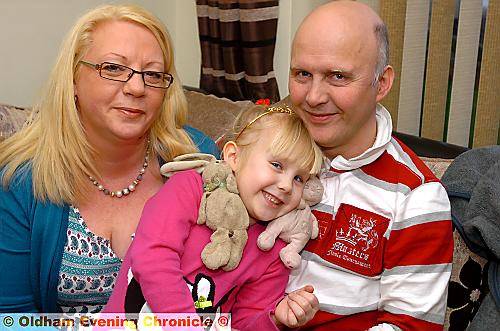Walking tall and having a ball
Reporter: Report by LEWIS JONES
Date published: 15 March 2011

Photo: Pictures: ANTHONY MILLER
BETTER now... Penny with parents Julie Stansfield and Phil Allsopp
AS Julie Stansfield carefully held her new-born daughter, the joy she sensed was overwhelming. She couldn’t have imagined the ordeals little Penny would have to go through in the first few years of her life. Six years and three avoidable operations later, Julie opens up about her experiences with Developmental Dysplasia of the Hip (DDH) to coincide with Baby Hips Health Awareness Week which runs all this week.
LABELLED a simple “toddler waddle” by doctors, Julie was unconvinced that her daughter’s imbalance could merely be written off.
She knew something was wrong.
It had been two years since she gave birth to Penny in 2004 at the Royal Oldham Hospital when she found herself pleading with doctors to carry out further enquiries.
Julie, of Birch Drive, Lees, was by her daughter’s side as doctors did routine health checks, hours after birth in August, 2004.
Three weeks’ premature and first-born to Julie, who was 35 at the time, Penny was then sent for an ultrasound scan after doctors did the test for the common condition “clicky hips”.
Julie was told the results were clear. Fast-forward to 2006 and Julie became increasingly concerned about her daughter.
She said: “She was walking with a wide gait and it just didn’t seem right. I took her to the GP who very kindly told me that I was being a bit overprotective as I was an older mum and that it was simply a ‘toddle-waddle.’”
Weeks passed and worries grew. “I ended up taking Penny back and saying ‘just look at her’ — he said he would trust a mother’s instincts and sent her to see a consultant,” added Julie.
Two-year-old Penny was diagnosed with Developmental Dysplasia of the Hip.
Babies with the condition are born with dislocated or unstable hips — Penny was found without a hip socket altogether on her left-hand side.
Causes of the hip not forming properly are not known, but it is thought that genetic factors and birthing effects, for example the baby being in the breach position, could be risk factors.
Julie and her family were then put through the agonising turmoil of seeing little Penny go through three separate operations to correct her walk.
Julie said: “If it doesn’t work it can cause significant long-term disability which was a worry for us. That feeling when your child goes under the anaesthetic for surgery was just horrendous. I wouldn’t want anyone to go through that. I was outraged that it had been missed on the scan, I was then told that the ultrasound results had gone missing.
“My daughter was put through three needless operations when it should have been followed through at birth.”
Each time Penny would have to spend eight weeks in a rigid ‘spica’ cast from her chest down, fixing her legs in place to encourage growth of the bones. One of the invasive procedures involved cutting through Penny’s thigh to reposition her leg. The simplest of daily tasks became a struggle.
With a special highchair donated by another family facing similar problems, unusual solutions were discovered.
“I had fantastic support from our family, Penny took it on the chin and coped fantastically,” Julie said. “She has always been a very happy child.”
Baby Hips Health Awareness week this week aims to light the spark of awareness among new parents and is being lead by hip health charity STEPS. The charity stresses the need for early diagnosis and awareness.
Penny, now six-years-old, has since made a full recovery, and is full of life, fun and enthusiasm.
Professor Adrian Davies, Director of the NHS Newborn & Infant Physical Examination Programme (NIPE) said: “STEPS plays a key role in raising awareness among parents and professionals. Together we must stop this unnecessary distress.”
Contact the charity at www.steps-charity. org.uk or call 01925-750 271.
Most Viewed News Stories
- 1The Oldhamers handed awards in King’s New Year’s Honours List
- 2You can score free tickets to a Latics game while supporting Dr Kershaw’s Hospice
- 3Public inquiry announced into rail upgrade that could leave villages ‘cut off’ for months
- 4Primary school in Uppermill considers introducing new ‘faith-based’ entry criteria to tackle...
- 5Tributes paid following death of hugely respected Oldham community figure Dale Harris




